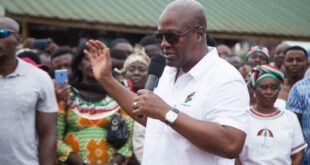Approximately 1.35 million people are expected to be registered to vote in the 2023 elections, which will take place between September 12 and October 2.
This is based on the EC’s prediction that, by 2020, at least 1,350,000 people may have reached the age of 18 since the last registration exercise.
The nationwide exercise will take place every day between 8 am and 5 pm, including weekends.
The EC Chairperson, Jean Mensa, revealed the dates and procedures for the exercise yesterday at a press conference titled “Let the Citizen Know” in Accra. Mensa noted that by the time of the previous registration exercise in 2020, the National Identification Authority (NIA) had registered over 10 million people.
“Indeed, some 10 million plus persons used the Ghana Card as proof of citizenship during the 2020 elections,” Mrs Mensah said.
“Today the NIA has on its roll close to 18 million registrants; that is eight million more persons since the 2020 Voters’ Registration exercise.” She added.
“Per the 2021 census figures, 450,000 Ghanaians attain the age of 18 every year, and therefore qualify to be registered to vote.
“The point we seek to make is that it is highly likely that most, if not all of these 1,350,000 persons, already have the Ghana Card,” she said.
The EC chairperson said the commission did not “believe that upholding the L.I. 2111 and enforcing the use of the Ghana Card to prove a person’s citizenship would disenfranchise citizens as was being alleged by sections of our society.
“Indeed, it is in the commission’s interest to register all eligible voters and not exclude and disenfranchise them.
The EC of Ghana is the entity that is most eager to establish a credible and inclusive voters’ register, she continued.
According to Mrs. Mensa, the commission was proud that the 2020 Voters’ Register accurately complied with international criteria for voter registration and included information on 55% of the nation’s population.
The EC head hinted, “You will recall that in 38 days the commission registered 17 millions and 270,000 persons out of a total population of 31 millions.”
However, Mrs. Mensa stated that the EC “found it unfortunate” that its efforts to increase the legitimacy and integrity of our voter list and, consequently, our elections by introducing this new draft C.I. did not receive the support of Parliament.
The new draft C.I. suggests using the Ghana Card as the only form of identification for citizenship, as well as continuous voter registration at all EC district offices.
She expressed regret that Members of Parliament were of the view that the NIA should fully resume its registration exercise nationwide before the C.I. could be considered.
Sadly, Mrs Mensa explained that the NIA had not fully commenced its operations nationwide due to lack of resources.
That, she said, left the EC with no option than to rely on the current C.I. with its inherent weaknesses to conduct the voters’ registration exercise until such time that the NIA would become fully operational.
Mrs Mensa said experience from the 2020 registration exercise had shown that many minors and foreigners used the window of the guarantor system and their names were found on the voters register.
With the establishment of the District Registration Review Committees (DRRCs), she explained that 40,000 minors and foreigners were challenged during the registration exercise and 15,000 names were expunged from the voters register.
Touching on the modalities for the voters’ registration exercise, the EC Chairperson said Article 42 of the 1992 Constitution conferred on every Ghanaian who was 18 years and above and of a sound mind the right to register and vote.
Article 45(a), she emphasised, also mandated the EC to compile the voters’ register and at such periods that might be determined by law.
“It is in the discharge of this mandate and as part of the EC’s preparation towards the conduct of the 2023 DLE that it will undertake a Voter Registration exercise,” Mrs Mensa stressed.
The EC Chairperson stated that registrants were required to show proof of identification by presenting the Ghana Card or the Ghana Passport, adding that those who did not have any identification documents must present two people who were already registered voters to vouch for their citizenship and age.
The EC Chairperson further explained the registration process, stating that it would involve both offline voter registration using the Biometric Voter Registration (BVR) kit and online voter registration using the District Management System (DMS).
She added that each political party would be allowed to present one representative to witness the registration exercise and that copies of daily reports of the registration exercise from the start to the finish will be handed to political party representatives at the various registration centers.
Regarding replacing lost ID cards, Mrs. Mensa stated that voters would have to pay GH10 and emphasized that it is unlawful for someone who has lost their ID card to register again.
Regarding replacing lost ID cards, Mrs. Mensa stated that voters would have to pay GH10 and emphasized that it is unlawful for someone who has lost their ID card to register again.
Regarding challenging instances, she stated that the process followed the C.I.91 amendment and that the DRRCs would be reconvened to sit on all challenges.
On December 19, 2023, the District Level Elections (DLE) will take place in all of the districts’ 6,272 electoral areas, with the exception of Nkoranza North and South in the Bono East Region.
Due to security concerns, the DLE for the two districts was not held until April 2020. The next DLE for both districts will be held in 2025.
Source: Ghanatodayonline.com
 Ghanatodayonline.com News, Politics, Health, Education & More
Ghanatodayonline.com News, Politics, Health, Education & More



